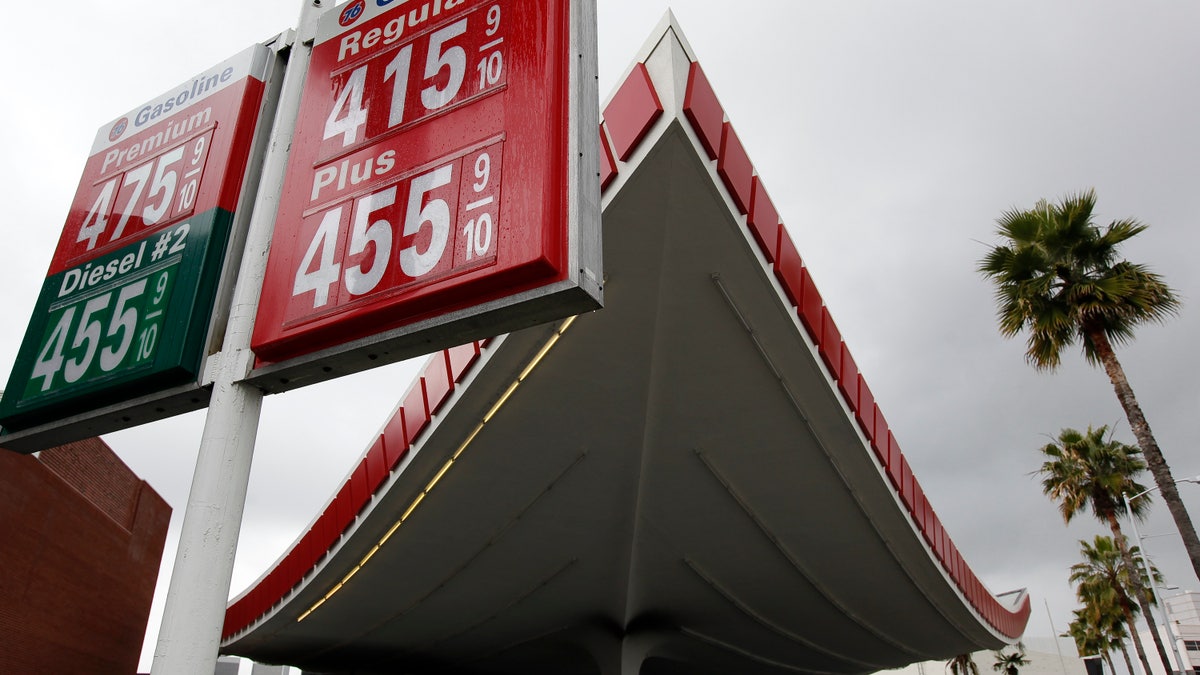
Feb. 25: Gas prices passed $4 a gallon in Beverly Hills, Calif. Oil prices are subsiding after reports of some Libyan ports reopening to tankers and Saudi Arabia boosting exports. (AP)
With gas prices rising and Americans hurting, Barack Obama decided to bring attention to the urgent need for a new energy policy. He decided a speech was in order.
The location: a gas station in Indianapolis. The words on his podium: “Investing in Energy Independence.” The price of gas on the sign behind him: $3.55. The price of oil: $110 a barrel. The promise: to “solve this energy crisis once and for all.”
The year: 2008.
As a candidate, Barack Obama declared that now was the time to end our dependence on foreign oil. But as president, he decided that major task could wait.
And today, gas prices are skyrocketing. Americans have seen price spikes before, but this is different. It’s February—months from the summer driving season. We’ve never seen price spikes this early in the year.
So President Obama, well aware of the threat this poses to his reelection prospects, decided it was time for, you guessed it, a speech on energy.
In Florida last week, he argued that a successful energy policy requires “serious, sustained commitment.” It was nothing new. We’ve heard the rhetoric before, but we’ve seen zero “commitment” since the president took office. Indeed, last year he admitted that his energy policy was “just a hodgepodge.”
That “hodgepodge” has had serious consequences. President Obama’s decisions on energy policy have taken America in the wrong direction.
Despite the need for domestic energy, he closed federal lands to drilling and mocked those who call for more oil production.
He killed the Keystone XL pipeline project, blocking an affordable, reliable source of energy—and jobs. Now, that oil will likely be sold to China instead of the United States. And we will continue to import from unstable regions in the world instead of Canada.
The president should welcome Keystone. He should open up energy production onshore and offshore, and he should end his efforts to increase taxes and onerous regulations on American energy.
Obama’s decisions have cost us—and not just at the pump. With the stimulus, he gambled billions in taxpayer money on green energy companies like Solyndra, the now-bankrupt California-based solar energy company. Solyndra’s bankruptcy has left taxpayers on the hook for over half a billion dollars and put 1,100 employees out of work.
For three years, the president has done nothing meaningful to keep energy prices low, and now that Americans are feeling the pain at the pump, they are rightfully going to hold him accountable.
In an effort to deflect criticism of his failed policies, Obama has begun touting the fact that oil production is up in recent years. Yet that is not because of his policies; it’s in spite of them. More state lands and private lands have been opened up for oil production, but it’s no thanks to Obama. In fact, he has actively fought energy development, closing federal lands opened by his predecessor.
President Obama says there is no “silver bullet” to lowering gas prices, which makes his three years of inaction all the more devastating. Had the president spent his time working to develop reliable domestic energy—a “serious, sustained commitment”—we might face a very different situation today.
The president is quick to deny responsibility and downplay his role in all this. As usual, he attributes blame to everyone but himself. President Obama would do well to heed the words of former Senator Obama, speaking in 2006 about $3 a gallon gas: “The time for excuses is over.”
This is all characteristic of this president and part of a larger pattern. On so many issues—the economy, jobs, health care, housing, the deficit, the debt, and more—he made bold promises and then failed to keep them.
Now he promises things will be different in a second term. But if he can’t keep his promises in the face of reelection, why would he keep them in a second term? Restating old promises is no substitute for leadership. It’s quite the opposite, and it destroys his credibility.
Thanks to the president, America is running on empty. And that leaves the president running on empty promises.
Reince Priebus is chairman of the Republican National Committee.
